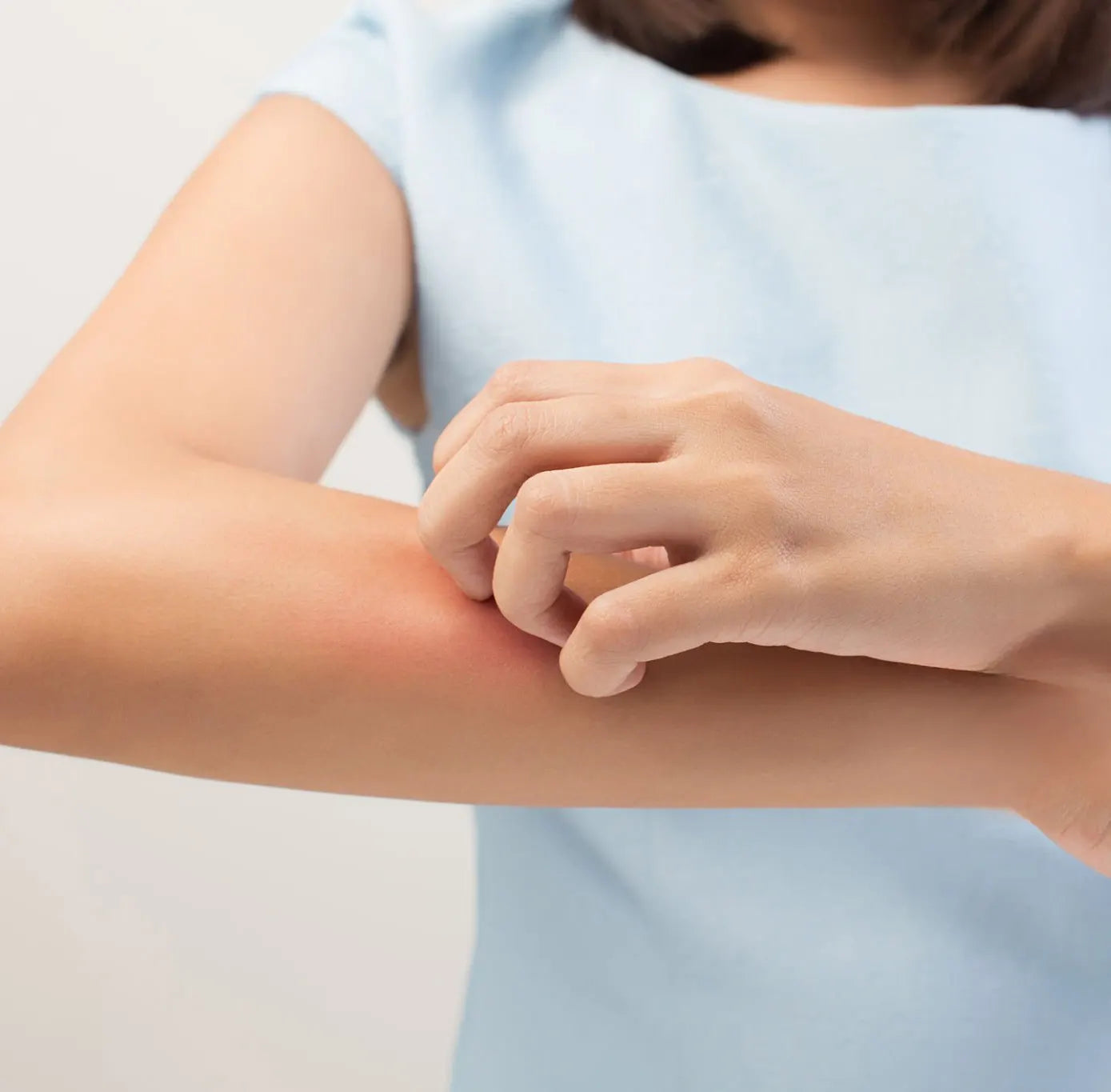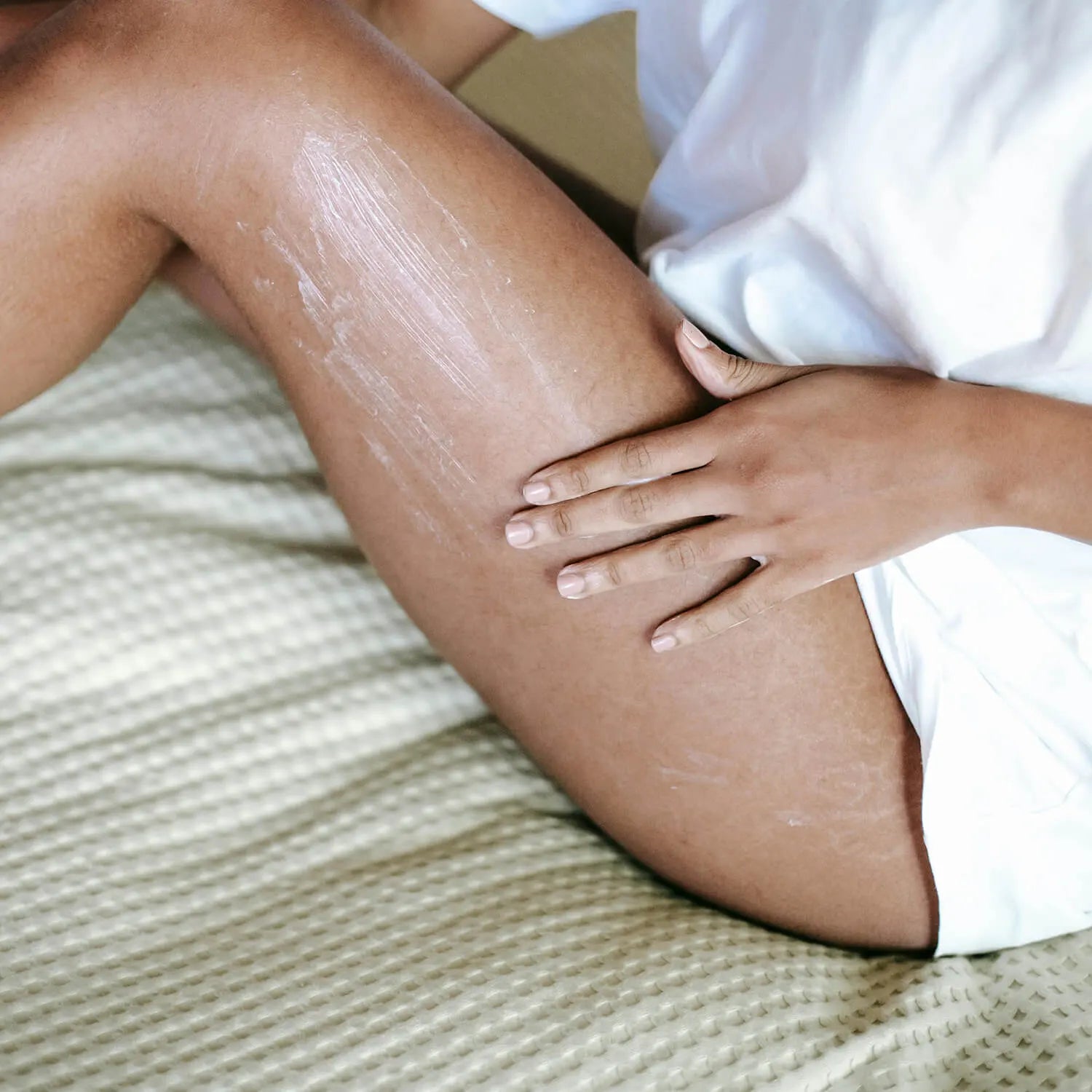
Understanding and relieving psoriasis
What is psoriasis?
Psoriasis is a chronic inflammatory, non-contagious skin disease. It is an autoimmune disease. It causes repeated bouts of itchy skin rashes. In Germany alone, around 1.6 million people are affected, including around 200,000 children and young people. Those affected try to hide the visible symptoms, suffer psychologically from the disease and withdraw into solitude. Psoriasis is currently considered incurable. However, there is a glimmer of hope: in rare cases - without us knowing the reasons for this - psoriasis can occur just once or completely disappear over the course of years.
symptoms of psoriasis
In psoriasis, the immune system attacks the body's own skin cells and destroys them. While the top layer of skin (epidermis) normally renews itself every 4 weeks, in psoriasis this process of skin renewal occurs at a rapid pace within just 3 to 4 days. Instead of a normal horny layer, the epidermis forms thickened, raised, inflamed, red and itchy scaly areas (plaques) that are sharply defined in some areas or spread over large areas of the skin. When removed by scratching, small bleeding usually occurs. Typically, the skin in psoriasis is covered with silvery, scaly layers, some of which peel off with a burning, itching sensation. Psoriasis can also affect nail changes, leading to discoloration, thickening and deformation. Sometimes psoriasis can also be accompanied by joint problems, known as psoriatic arthritis.
Depending on the type of manifestation, different forms of psoriasis are distinguished: psoriasis vulgaris, psoriasis pustulosa, psoriasis arthritis, psoriasis inversa or psoriasis guttata. In principle, psoriasis can occur in any part of the body. The hands and feet, knees, elbows, fingernails and toenails, and often the scalp (psoriasis capitis) are particularly badly affected by inflammatory processes and painful crust formation. On the face, the symptoms are often visible on the eyebrows and eyes.
causes of psoriasis
As with other autoimmune diseases, the exact causes of psoriasis are not known. Psoriasis appears to be primarily hereditary. Even infants and small children can exhibit the typical symptoms. However, psoriasis usually first appears after puberty and before the age of 40, with men and women being equally affected. The autoimmune disease rarely breaks out after the age of 60. One in three patients who suffer from psoriasis has a close relative who is also affected. Emotional factors also play a role: a sudden traumatic experience seems to be able to trigger or worsen psoriasis, as can psychological stress. Existing underlying diseases such as obesity or an unhealthy lifestyle can worsen psoriasis.
Medical Treatments for Psoriasis
-
Topical treatments
In conventional medicine, psoriasis is usually initially treated externally with cortisone preparations (glucocorticoids), tar-containing ointments and urea creams. These active ingredient therapies can sometimes temporarily suppress the painful symptoms of psoriasis, but they also have unpleasant side effects.
Regular and long-term use of cortisone is significantly more likely to result in side effects such as water retention, increased blood pressure, thinning skin, osteoporosis, increased blood sugar or a weakened immune system. Tar ointments, which are made from the distillation of coal tar, are not only irritating to the skin and increase sensitivity to the sun. They are even considered carcinogenic when used over a long period of time, as small amounts are absorbed into the body through the skin. Urea, the active ingredient in ointments or creams, also proves to be unhelpful for psoriasis when used over a long period of time. Urea binds a lot of moisture, but irritates the inflamed, already heavily stressed, over-reactive psoriasis skin even more. Urea raises the pH value of the skin and thus destroys the acid mantle, an essential component of the skin's own immune protection. In addition, urea dries out irritated and inflamed skin more and more when used over a long period of time.
Other topical treatments include creams, gels or lotions with calcineurin inhibitors, vitamin D analogues or retinoids, i.e. vitamin A derivatives. Retinoids can reduce inflammation, reduce excessive cell formation and relieve itching. However, retinoids are also increasingly associated with side effects such as skin irritation, flaking, thickened skin areas, dry mucous membranes or liver dysfunction. -
Systemic medications
In more severe cases, systemic medications such as methotrexate, cyclosporine, acitretin and apremilast can be prescribed, which are taken orally. Alternatively, biologics can be used. They are administered by injection or infusion and are intended to specifically modulate the immune system in order to reduce inflammation. -
light therapy (PUVA)
In controlled light therapy (PUVA therapy), the affected psoriasis skin areas are treated with UVA radiation of a specific wavelength. To increase the effect of the light therapy, a bath in salt water is taken beforehand or a combination with the drug Psolaren, which is applied as a cream to the affected skin areas. As a result, PUVA therapy increases the skin's susceptibility to sunburn. A generally increased sensitivity to light, pigment disorders, thickening of the skin and an increased risk of skin cancer are other side effects. -
laser therapy
Laser therapy is another conventional medical treatment option to reduce the excessive growth of skin cells, reduce inflammation and relieve the symptoms of psoriasis. In laser therapy, the affected areas of skin are irradiated with high-energy light in several sessions over a period of several weeks or months. In addition to the destruction of the skin barrier, side effects of laser therapy include temporary burns, redness, blistering or hyperpigmentation of the skin.
Proper scalp care
-
Shampoo :
Use a mild organic shampoo that does not contain alcohol or skin-irritating preservatives, such as the myrto organic anti-dandruff shampoo . In addition to the extremely skin-friendly surfactant mixture, it contains the greatest possible proportion of wash-active amino acids. Additionally, it contains skin-soothing sage and rosemary extract with an antimicrobial effect. -
scalp treatment :
The Organic Scalp Treatment F is recommended as a long-lasting organic scalp serum. This leave-in treatment contains an innovative antimicrobial lactylate active ingredient with a wide range of applications. The plant-based lactic acid ester not only works against dandruff, but also provides the scalp with additional moisture, dissolves stubborn plaque and helps to soothe inflamed red and flaky areas - without any unwanted side effects.
The right skin care
Since the skin in psoriasis is extremely dry and sensitive and prone to inflammatory lesions, proper care is essential. It helps to stabilize the skin's own protective barrier and provide the skin with much-needed moisture.
-
Facial cleansing :
For facial cleansing, you should choose a cleanser that is as nourishing as possible and does not contain surfactants, fragrances or alcohol, such as our rich organic argan cleansing cream. Avoid excessive rubbing when removing the cleanser, as this will make skin irritations worse. Avoid mechanical peelings. In general, your skin care should only have a few, high-quality and as natural ingredients as possible. The products should be free of fragrances, alcohol, preservatives and emulsifiers. -
facial toner
The mild organic Magnolia toner based on aloe vera with soothing chamomile extract and beta-glucan from oats was specially developed for sensitive or irritated skin. It helps to reduce irritation, moisturize and soothe the skin.
-
facial serum
The myrto Bio Hyaluron Serum 300 is ideal for sustainably hydrating psoriatic skin and counteracting cracks. The formula contains high doses of hyaluronic acid in various molecular sizes, which is absorbed into the deeper layers of the skin.
-
DMS face cream
Derma Membrane Structure Creams, or DMS face creams for short, are considered to be the optimal moisturizers for psoriasis. These are special creams that are preferred for skin conditions such as psoriasis. DMS creams do not contain emulsifiers, which are typically used to mix oil and water in a cream. Instead of emulsifiers, Derma Membrane creams use a structure that is similar to the lipid structure of the skin. This repairs and strengthens the skin barrier and promotes the skin's ability to retain moisture. One such face cream is the Bio Argan Day Cream T for dry and mature skin. In addition to a high proportion of natural, valuable oils, it also contains anti-inflammatory beta-glucan from oats, which relieves itching. -
facial balm
The Face Balm Amaranth with shea butter, evening primrose and amaranth seed oil is particularly recommended for extremely dry, rough and cracked skin. The water-free balm also helps to lock in moisture in the skin after showering.
What else you can do
There are a few things you can do yourself to relieve the symptoms of psoriasis without resorting to medication, conventional medical treatments and without side effects. The following tips are not the only solution, but they can help to reduce inflammation or to remain free of painful symptoms for a while.
-
strengthening the immune system
Psoriasis often occurs in connection with intestinal problems. The intestines are primarily responsible for the functioning of our immune system. If the intestinal defense system is overloaded, the risk of psoriasis getting worse increases. It is therefore essential to build up a healthy intestinal flora. -
Healthy eating
An unhealthy diet with denatured foods, acid-forming substances and additives promotes the outbreak of a psoriasis flare-up. Make sure you eat a wholesome diet. Prefer oils and fats with polyunsaturated fatty acids such as hemp oil, linseed oil or walnut oil on your menu. They are best used in salads or as a food supplement. -
Mental relaxation
Develop strategies to avoid unnecessary stress, because stress is a trigger factor. Yoga exercises, progressive muscle relaxation or mindfulness exercises are good ways to relax. But it is just as important to be aware of the positive aspects of all the adversities of everyday life. Reduce your perfectionism, maintain social contacts, exercise regularly and get plenty of exercise in the fresh air.
Conclusion
Even if you have to prepare yourself to live with psoriasis in the long term, you can significantly alleviate the symptoms with a holistic approach. Your body, your mind and your skin will thank you if you optimize your lifestyle, your diet and your skin care.






